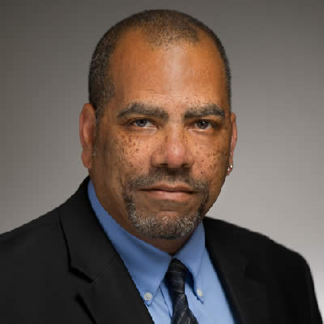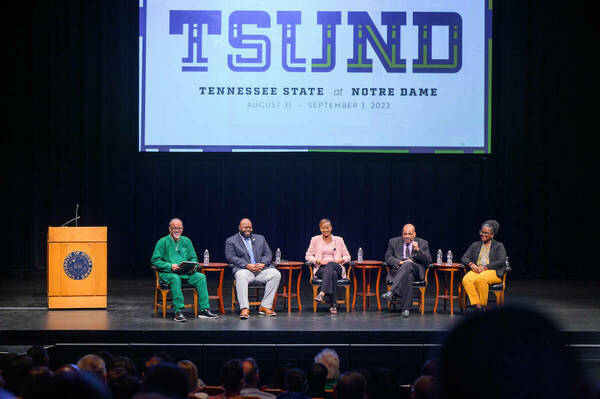Dear Friends,

The 2023-2024 academic year has gotten off to a fantastic start. As we enter our second full academic year of operations, the Office of Institutional Transformation is firmly positioned to lead and catalyze Notre Dame’s efforts to enhance inclusive excellence as a premier global Catholic research University, fostering a culture of belonging where all can thrive.
To quickly recap our first year, we focused our attention on several projects, including looking closely at the many diversity, equity and inclusion (DEI) activities already established on campus. We spoke with representatives of the units sponsoring them to determine which have been most successful and to identify those that have been most impactful. Our office also reactivated the campus-wide DEI Practitioners Group, a community of practice for embedded professionals and experts working to advance initiatives within their home units and departments. Last but not least, we took the crucial step of developing an Office of Institutional Transformation strategic plan that facilitates greater coherence for DEI initiatives across the University and sets forth specific goals for our office.
A great deal was learned from these endeavors about whence we have come in our DEI journey as well as the next steps we might take together. We are making steady progress toward our goal of building a local instantiation of the “Beloved Community” at Notre Dame.
Building a beloved community
Popularized by Dr. Martin Luther King, Jr., during the U.S. Civil Rights Movement of the 1950s and 60s, the Beloved Community is one centered on justice – not for any singular group, but for all – and where every member is welcomed and nurtured. It is a concept that resonates strongly with the principles of Catholic Social Teaching and their emphasis on the respect for the dignity of each individual and the need for solidarity in contributing to the common good.
A Beloved Community is also a truly inclusive community as outlined in the Board of Trustees Task Force report Advancing Diversity, Equity, and Inclusion at Notre Dame: A Strategic Framework (2021).
“We must fight against racism and all forms of injustice and inequity in our nation and the world,” the task force members wrote. They go on to say: “On our campus, we must examine the ways in which we can better live the ideals we profess. We pride ourselves on being a place of community, where all are welcomed and supported. We must acknowledge the ways in which we have fallen short in this regard and strive to become a better version of ourselves.” This report provides the essential touchstones for everything we hope to accomplish.
The power of collaboration
As we put these efforts in the context of our office’s work this academic year, it is increasingly vital that we work synergistically with our peers across campus while finding an ideal balance between central and distributed oversight of DEI work. One means for achieving such an outcome is through supporting the more than 160 DEI practitioners working in formal and informal roles across campus.

This potential was on full display earlier this semester when the University received fans of Tennessee State University and neighbors from the South Bend-Elkhart area for Notre Dame’s first football game against one of the nation’s Historically Black Colleges and Universities (HBCUs).
It was an honor for our office to collaborate with DEI practitioners on several key events leading up to the game that helped to build community and broaden perspectives, including:
-
The Black and Indigenous Faculty & Student Welcome Celebration, hosted by the Provost’s Office, to celebrate our students and provide an opportunity for undergraduate students, graduate students, and faculty to connect with each other.
-
The Provost Office’s launch of the Maintaining Linkages Initiative, led by Keona Lewis, assistant provost for academic diversity and inclusion. The initiative seeks to cultivate meaningful connections between Notre Dame faculty and alumni from groups traditionally underrepresented in the academy who have completed, are pursuing, or are nearing the completion of doctoral degrees and who have received or may be seeking academic appointments at colleges or universities.
-
A Powerful Conversation with TSU President Glenda Baskin Glover, part of ThinkND’s Powerful Conversations series hosted by Angela Logan, the St. Andre Bessette Academic Director of the Master of Nonprofit Administration Program and associate teaching professor at the University of Notre Dame’s Mendoza College of Business.
-
The Historical and Current Significance of HBCUs presentation and panel discussion, where I joined Dr. Charlie Nelms, former chancellor of North Carolina Central University, and other HBCU alums who work at Notre Dame. Organized by Eric Love, director of staff diversity, and sponsored by Human Resources and the DeBartolo Performing Arts Center, the event highlighted the valuable role HBCUs play in the higher education landscape.
These and other unique TSU-ND events provided opportunities for cultural enrichment, community engagement, and individual and collective education. As we proactively and thoughtfully work together on future opportunities, I am confident that we will continue to see greater collective impact and effectiveness.
There’s a role for everyone to play
As people get to know our office, it’s not uncommon for them to ask: “What is your vision for institutional change?”
That vision is a communal rather than individual one. Ours is the multi-generational, ongoing, and collective task of making the University an ever more just, open, welcoming, diverse, inclusive, and vibrant place of inquiry and learning. This responsibility — and the unit-specific programs and individual actions that make it possible — are ours to shoulder together. One person, whatever their title or administrative remit, can’t do this alone. This is something for which we all must have ownership.
There is also a special role for universities like Notre Dame to play – particularly when DEI work is understood as part of our institutional identity and mission; when it is set within a dynamic transformational matrix; when we understand that our efforts must be intensive and for the long term; and when we situate ourselves as ethically minded facilitators of difficult conversations.
This is an exciting time to be involved in DEI work. I thank you for your commitment to these efforts, and I look forward to working with you in the years ahead.
Sincerely,
(The Rev. Canon) Hugh R. Page, Jr., DMin, PhD, LHD